So, let's talk about agricultural investment.
Agricultural investments in Ghana have so much potential to drive economic growth and sustainable development.
Ghana has abundant fertile land, diverse climate conditions, and a large labor force, which offers significant opportunities in crop production, livestock, and agribusiness.
It is not a hidden fact that Agriculture remains the backbone of Ghana's economy.
It contributes to food security, employment, and export revenue.
Despite all this, numerous challenges such as limited access to finance, modern technology, and infrastructure continue to hinder its full potential.
The call to increase investments in this sector could accelerate rural development, reduce poverty, and position Ghana as a key player in global agricultural markets.
Take a look at the data report below.
"About 52 % of the labour force is engaged in agriculture, 29 % in services and 19 % in industry. Approximately,
39 % of farm labour force is women. Agriculture contributes to 54 % of Ghana’s GDP, and accounts for over 40 % of
export earnings, while at the same time providing over 90 % of the food needs of the country. Ghana’s agriculture
is predominantly smallholder, traditional and rain-fed (SRID, 2001)."
"About 136,000 km2 of land, covering approximately 57 % of the country’s total land area of 238,539 km2 is classified
as "agricultural land area" out of which 58,000 km2 (24.4 %) is under cultivation and 11,000 hectares under irrigation.
About 60 % of all farms in the country are less than 1.2 hectares in size, 25 % are between 1.2 to 2.0 hectares, with a
mere 15 % above 2.0 hectares. The mean farm size is less than 1.6 hectares. Small-size and medium-size farms of up to
10.0 hectares account for 95 % of the cultivated land (SRID, 2001)."
United Nations SDG GOAL #2
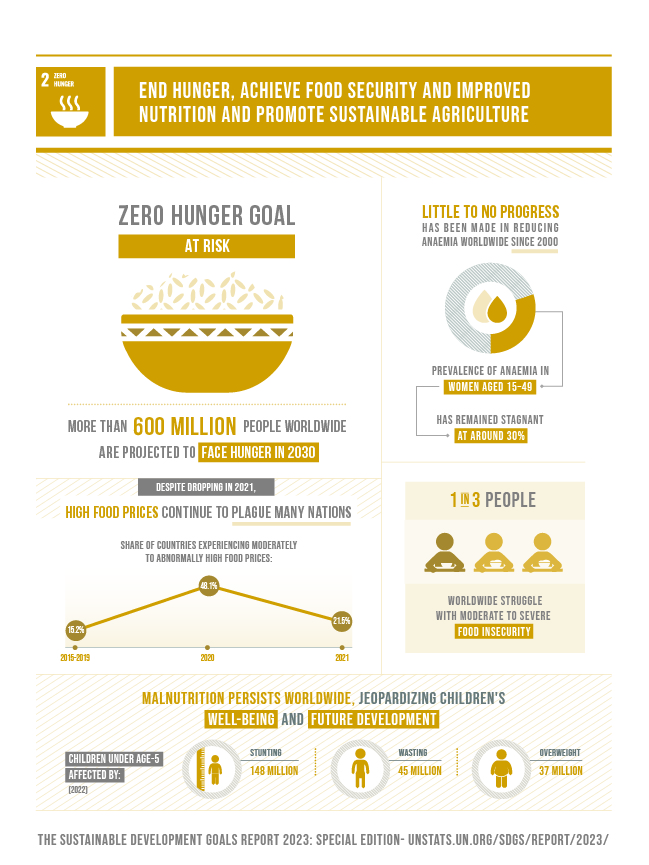
In line with the UN Department of Economic and Social Affairs Sustainable Development (SDG) Goal #2: End hunger, all nations are called, Ghana inclusive, to achieve food security, improve nutrition and promote sustainable agriculture.
Related Posts
- Positive Investment Culture: What to Invest in With GHS100
- Make Money Online The Right Way For Every Ghanaian
- Losses in Investments: Why People Lose Money When They Invest
INVESTMENT OPPORTUNITIES IN AGRICULTURE
According to the Ghana Investment Promotion Centre (GIPC) website's documentation on the agriculture sector, opportunities for investment can be found but not limited to the following areas.#1 Rice Production
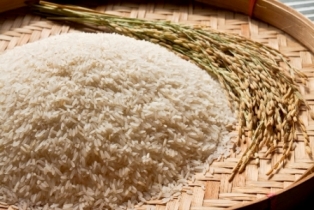
Ghana consistently runs a trade deficit in the production of paddy rice and this offers great
opportunities for commercial farming to plug this deficit and provide input to the local rice processing
factories.
It is worthy to note that, the existence of planting for food and jobs together with tax exemption provide an enabling
and incentivized environment to ensure a viable and profitable establishment of a commercial rice farm.
#2 Shea Butter Processing
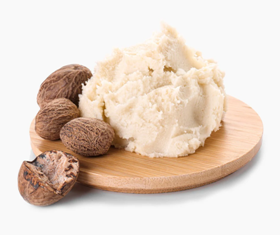
The global shea butter market is expected to reach a market value of US$3.5b by the end of 2028, with an expected
CAGR of 5.2% over the next five years, according to GIPC website.
The demand for shea butter products in the northern part of the country has soared in recent times.
#3 Cocoa Production

The successful implementation of Productivity Enhancement Program by COCOBOD will increase the yield in production
actions to sustainably increase plant health and fertility, developing irrigation systems and rehabilitating
aged and diseased crops. Increased yield on cocoa presents a viable opportunity in the Ghanaian cocoa industry
Cocoa beans contributed 60% of Ghana’s total export revenue from cocoa products in 2020; the availability of cocoa
beans presents a huge opportunity for cocoa processing factories in Ghana.
#4 Climate Resistant Seeds and Technology
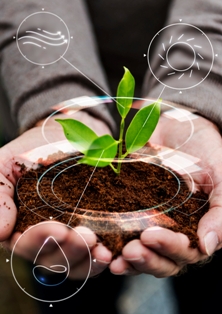
GIPC informs that, with Ghana's rain cycles distorted due to climate change, farmers find it difficult to rely
on rainfall to predict planting seasons.
Thus, the need for climate resilient and adaptable technology in Ghana's agricultural landscape.
#5 Poultry and Fish Feed Equipment Manufacturing

According to GIPC website, research has shown that poultry and fish feed is not produced in commercial quantities due to
lack of requisite machinery.
Thus, a call is being made to all potential investors to really consider this sector of Ghana's agriculture with
a potential for massive returns.
#6 Aquaculture Production

There are many opportunities that exist in aquaculture production, states the GIPC, particularly in tilapia rearing using modern techniques that reduce waste and inefficiencies as well as reduce costs while boosting output and revenue.
POTENTIAL INVESTMENT CHALLENGES
Despite all the exciting opportunities outlined above, It must be noted that investment in agriculture comes with its own well defined challenges.It behoves on every investor to guard themselves on these to make informed decisions to avoid making losses.
These challenges include:
- Limited access to finance
- Lack of modern technology
- Inadequate infrastructure
- Unpredictable rainfall patterns
INTERVENTIONS TO INVESTMENT CHALLENGES
Considering the challenges above, there have been notable interventions by the government especially.The Government of Ghana through the Ministry of Education, has outdoored several interventions to tackle challenges in the agriculture sector.
These include:
Planting for Food and Jobs
The objective of this campaign is to provide job opportunities for the youth by increasing the production of crops in the country thereby decreasing the importation of food. It also seeks to modernize the agriculture sector of the economy in order to improve food security.
Food System Resilience Program (FSRP2)
This program is under the World Bank Multi-Phase Programmatic Approach (MPA), this campaign seeks to strengthen regional food system risk management, improve the sustainability of the productive base in targeted areas and to develop regional agricultural markets.
Ghana Agriculture Sector Investment Programme (GASIP)
The overall goal is to contribute to sustainable poverty reduction in the rural parts of Ghana. The programme is implemented along three key components which includes Value chain development, rural value chain infrastructure and; knowledge management, policy support and co-ordination.
Savanah Investment Programme (SIP)
This is an initiative by government to reduce importation of meat through increased commercial broiler production, enhance competitiveness of the poultry industry and contribute to improved nutrition security.
Youth in Agriculture
This is an initiative to motivate the youth to accept and appreciate farming/food production as a commercial venture, thereby taking up farming as a life time vocation.
European Union Ghana Agriculture Programme (EU-GAP) in-savannah-ecological-zone
This is initiative is to provide critical infrastructural investments and strengthen integrated business models along selected value chains to stimulate inclusive and sustainable economic growth.
Ghana CARES "Obaatan pa" Programme
The initiative is to ensure rapid competitive import substitution, support to commercial farming (particularly by the educated youth), increased food security, and the supply of raw materials (at scale, high quality and high reliability) for agro-processing industries for value-addition, job creation, exports, and industrialization.
The Savannah Zone Agricultural Productivity Improvement Project (SAPIP)
The Project's overall development goal is to restructure agricultural value chains in the Savannah Zone for food and nutrition security, employment creation, and wealth generation.
Ghana Commercial Agricultural Project (GCAP)
This initiative is to improve agricultural productivity and production of both smallholder and nucleus farms in selected project intervention areas of the recipient’s territory.
The Ghana Peri-Urban Vegetables Value Chain Project
The project is closely linked to the Government of Ghana’s strategy for poverty reduction: improving food security by increasing production and market access for vegetable both for domestic consumption and exports.
There you go.
The level and nature of these interventions signifies the government's efforts and drive to make agriculture resilient and sustainable.
WHY INVEST IN GHANA'S AGRICULTURE?
The GIPC outlines the following reasons why potential investors are encouraged to invest in Ghana's agriculture.- Ghana’s current literacy rate is reported to be 69.8% as of 2021 making it one of the best in the West African sub region.
- Ghana has a youthful population, about 67% of labour force fall within the ages of 15 to 64 years.
- The daily minimum wage of GHS 13.5 (c.US$ 2), is low as compared to other advanced economies (c.US$ 7.2 per hour in the US in 2021), Ghana’s low labor cost is very attractive for setting up agricultural companies and farms.
Human Resources
- A 5–10-year tax holiday for companies in the agriculture sector.
- Concessionary corporate income tax rates.
- Tax losses for companies within the agriculture sector can be carried forward for up to five years.
Tax Incentives
- Land ownership is legislated under the Land Act 2020, Act 1036.
- The Model Lease Agreement (MLA) has been drafted by the Ministry of Food and Agriculture for large-scale commercial transactions; this seeks to protect the interest of large-scale farmers.
Land Acquisition and Management
- Road networks are being implemented across the three Northern regions of Ghana.
- Feeder roads have been constructed under the Afram Plains District Agricultural Development Project.
- There are six ferries that offer water transport locally. In addition, the Volta Lake Transport Company Limited (VLTC) is the main means of transport on the Volta lake, This is jointly overseen by the Ministry of Transport and the Volta River Authority.
- The Export Marketing and Quality Awareness Project (EMQAP) rehabilitated, surfaced, and constructed feeder roads in the Volta, Eastern, and Central Regions
Access to Farming Communities
- The international airport has a 10,00 m2 perishable cargo center. This facility provides handling and temporary storage for perishable produce for export.
- There are planned interventions for the rehabilitation of existing fisheries facilities and 11 new fishing landing sites and harbours along the coast and Volta Lake.
- Government targets the construction of 30 warehouses, each with a capacity of 1000 Mt, under the one district one warehouse initiative.
Storage and Warehousing
All said and done...
Ghana's agricultural sector is brimming with massive investment opportunities so let's all take advantage of it.Happy Investing.
This post has cited information from the underlisted credible sources:
FAO of the UN: Ghana at a glance
GIPC: Ghana's Agriculture Sector Report (Nov, 2022)
GIPC: Highlight on Ghana's Agriculture and Agroprocessing Sector
UN Sustainable Development Goals (SDG #2)

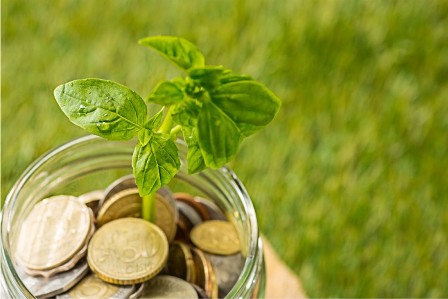
Comments